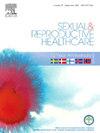希腊雅典辅助生殖技术部门女性工作人员对社会选择性卵母细胞冷冻保存的认识、意图和态度
IF 1.7
3区 医学
Q3 PUBLIC, ENVIRONMENTAL & OCCUPATIONAL HEALTH
引用次数: 0
摘要
目的本研究旨在调查雅典辅助生殖技术(ART)单位医护人员对计划卵母细胞冷冻(POC)的知识水平和信念。方法于2024年5月对雅典市两个主要ART单位(IASO妇产医院生命研究所和Mitera妇产医院HYGEIA IVF胚胎发生科)的105名女性工作人员进行横断面调查。参与者在获得书面许可的情况下完成匿名调查问卷,调查问卷改编自Kim等人的(1)关于卵母细胞冷冻保存意识的研究。问卷由专业人员翻译成希腊语,并经过正式的验证过程。获得了所有参与者的知情同意。结果91名被调查者(有效率86.7%)中,97.8%的人知道POC。年龄较小(p = 0.018)、收入较高(p = 0.024)和研究生学历与考虑卵母细胞冷冻的可能性较大相关。医学咨询与考虑POC显著相关(p = 0.001),而那些通过教育讲座获得信息的人更有可能积极看待POC。尽管有专业的接触,但只有一半的人接受过生育咨询。参与者被分为两组:考虑过冷冻卵子的(N = 46)和没有考虑过冷冻卵子的(N = 45)。在年龄、收入、受教育程度、信息来源等方面存在显著差异。该研究强调,希腊的ART专业人员支持女性出于社会原因冷冻卵子的权利,并强烈支持在OB/GYN就诊期间进行生育咨询的必要性。结构化的教育和临床指导在形成对POC的态度方面显得至关重要。本文章由计算机程序翻译,如有差异,请以英文原文为准。
Awareness, intentions, and attitudes towards social elective oocyte cryopreservation among female staff in assisted reproductive technology units in Athens, Greece
Aim
The purpose of this study is to investigate the knowledge level and beliefs of healthcare professionals working in Assisted Reproductive Technology (ART) units in Athens, regarding Planned Oocyte Cryopreservation (POC).
Methods
A cross-sectional survey was conducted in May 2024 among 105 female staff at two major ART units in Athens: Institute of Life IASO, IASO Maternity Hospital and the HYGEIA IVF Embryogenesis unit, Mitera Maternity Hospital. Participants completed anonymized questionnaires, adapted from Kim’s et al.(1)study on oocyte cryopreservation awareness, with written permission. The questionnaire was professionally translated into Greek and underwent a formal validation process. Informed consent was obtained from all participants.
Results
Among the 91 respondents (86.7 % response rate), 97.8 % were aware of POC. Younger age (p = 0.018), higher income (p = 0.024), and postgraduate education were associated with a greater likelihood of considering oocyte cryopreservation. Medical counselling was significantly associated with consideration of POC (p = 0.001), while those informed through educational lectures were more likely to view it positively. Despite professional exposure, only half had received fertility counselling. Participants were divided into two groups: those who had considered egg freezing (N = 46) and those who had not (N = 45). There were significant differences in age, income, education level, and information sources between groups.
Conclusion
This study highlights that ART professionals in Greece support a woman’s right to freeze her eggs for social reasons and strongly endorse the need for fertility counselling during OB/GYN visits. Structured education and clinical guidance appear critical in shaping attitudes toward POC.
求助全文
通过发布文献求助,成功后即可免费获取论文全文。
去求助
来源期刊

Sexual & Reproductive Healthcare
PUBLIC, ENVIRONMENTAL & OCCUPATIONAL HEALTH-
CiteScore
2.70
自引率
5.60%
发文量
73
审稿时长
45 days
 求助内容:
求助内容: 应助结果提醒方式:
应助结果提醒方式:


